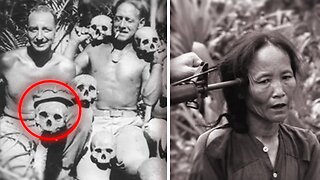Love-Making And Marriage In Imperial Japan
The fall of the Tokugawa Shogunate in 1868 ushered in the age of Imperial Japan in what is known as the Meiji Restoration. For almost 80 years, the Japanese Empire would change the life of many within Japan’s borders and beyond until its fall at the end of the Second World War. One of the many things that the Imperial age altered was the love, sex, and marriage behaviours of the Japanese people. The Meiji Restoration brought about a conservative, nationalist, and eugenicist view of the world that emphasized collective obligation in all things. The family was a microcosm of the nation and loyalty to it became the most important of virtues.
Today on A Day In History, we explore love-making and marriage in this changing Imperial Japan. If you enjoy videos like this, don’t forget to like and subscribe to support us and keep updated on future content.
The ie
Before we can understand love and marriage in Imperial Japan, we must first understand the importance of the ie.
The ie is the name for the Japanese family system. It refers to the combination of blood relatives, property, reputation, ancestors, and future generations that make up the family. To be part of the ie is to be part of a single shared unit. In the age of Imperial Japan, the ie was the main legal building block of society and property belonged to the ie as a whole, not to individual members.
All members had to sacrifice their interests for those of the ie as a whole. Members of the ie had a duty to maintain its dignity and prosperity by acting properly and following the complex hierarchies of family life. They also had a duty to pay respect to their ancestors and an obligation to provide children to continue their ie and maintain it’s property so it could be passed down to them. As one haiku put it, each member of the ie was expected to: “Live and die after one another, cultivating the rice field in turn.”
The ie of the Imperial period was especially patriarchal, with men acting as the heads of the household and women expected to be obedient to every man. The wife obeyed her husband, the daughter obeyed her father, the sister obeyed her brother, and so on. Filial piety - the respect owed from children to their parents - was a vital part of the power dynamics of the ie.
The ie has been the foundation of Japanese social structure for generations and it gained increased importance during the Imperial period as the Imperial government emphasized tradition, stability, and order among the Japanese populace.
Love, sex, and marriage were all important to the ie. The addition of new members through marriage or childbirth was understandably of great concern. In Imperial Japan, the ie became increasingly influential over the love lives of all of its members.
#imperialjapan #history #marriage #comfortwomenjapan
Scriptwriter: Nathan Hewitt
Video Editor & Motion Graphics: Jason Bohol
Voice-over Artist: Stephan Vox
Music: Motionarray.com
Copyright © 2022 A Day In History. All rights reserved.
Sources: Damian Flanagan, ‘The shifting sexual norms in Japan's literary history’, The Japan Times, (November 19th, 2016)
Jaered Koichi Croes, The Gay of the Samurai: All About Homosexuality, Buddhist Monks, Samurai, and the Tokugawa Middle Class, Tofugu, (September 30th 2015)
Jennifer Robertson (ed.), A Companion to the Anthropology of Japan, (2005)
Joyce Lebra et al (ed.), Women in Changing Japan, (1976)
Joy Hendry, Marriage in Changing Japan: Community and Society, (2010)
Marcia Yonemoto, The Problem of Women in Early Modern Japan, (2016)
DISCLAIMER: All materials in these videos are used for entertainment purposes and fall within the guidelines of fair use. No copyright infringement intended. If you are, or represent, the copyright owner of materials used in this video, and have an issue with the use of said material, please send an email to adayinhistory2021@gmail.com
-
 19:31
19:31
A Day In History
8 months ago $0.15 earnedBIGGEST American War Crime Cover-Up Of The Vietnam War (Warning* Mature Audiences Only)
5011 -
 2:45
2:45
Chicks in the Office
6 hours agoHolly Madison Talks Reconciliation with Kendra Wilkinson
40.7K28 -
 LIVE
LIVE
Di bear
8 hours agoFinal Season Mission, Pantheon | Destiny 2
553 watching -
 6:54:43
6:54:43
SquallRush
10 hours agoAthenian Rhapsody!
41.8K7 -
 1:47:01
1:47:01
Real Coffee With Scott Adams
9 hours agoEpisode 2492 CWSA 06/01/24
54.8K51 -
 2:08:10
2:08:10
LFA TV
9 hours agoEP 47: Miles Guo Trial Special with Special Guests - Truth, Betrayal, and Fox Hunt | WHISTLE BLOWERS 6.01.24 12pm EST
48.3K14 -
 1:13:59
1:13:59
Tactical Advisor
7 hours agoVault Room Tour/Unboxing- Vault Room Live Stream
42.8K3 -
 1:11:28
1:11:28
The Squad
14 hours agoArsenal's Huge Summer🚨Olise to Man Utd DEAL✅ Osimhen to Arsenal or Chelsea☑️ UCL Final Preview
60.4K10 -
 56:23
56:23
Trumpet Daily
1 day ago $1.10 earnedCohen Is Free to Lie and Steal, but Trump Is Guilty of Something - Trumpet Daily | May 31, 2024
45.5K57 -
 8:26
8:26
MichaelBisping
1 day agoBISPING CHOKES OUT STEVE-O! | JACKASS STAR PUT TO SLEEP BY UFC CHAMP! *FULL VIDEO*
62.7K13